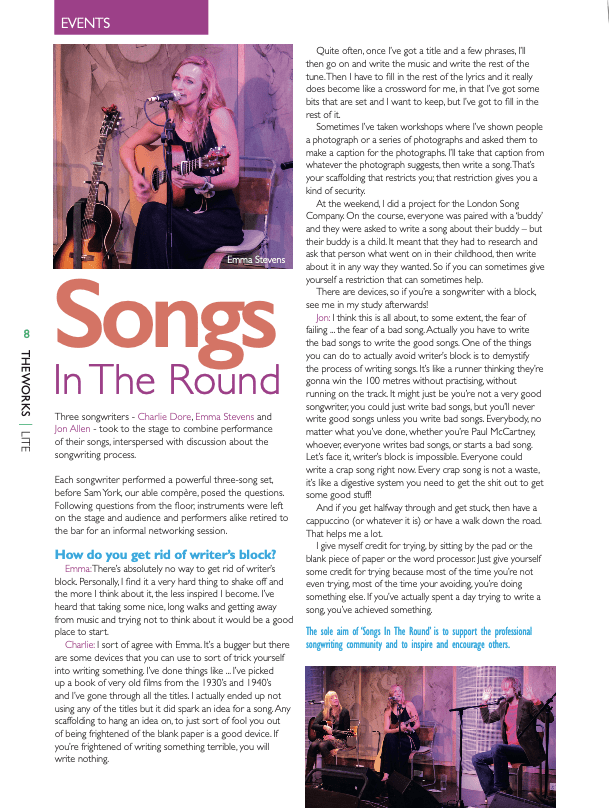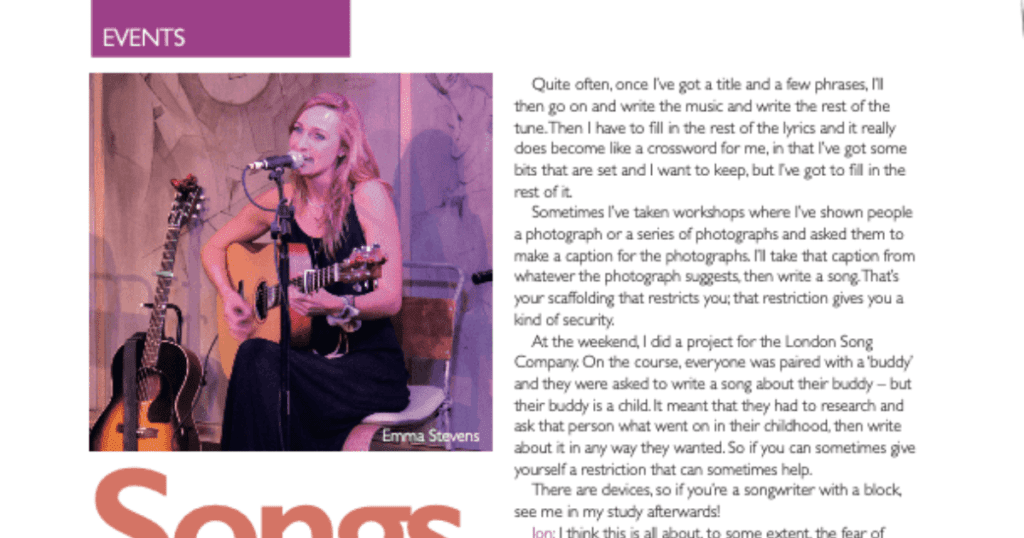
Three songwriters – Charlie Dore, Emma Stevens and Jon Allen – took to the stage to combine performance of their songs, interspersed with discussion about the songwriting process.
Each songwriter performed a powerful three-song set, before Sam York, our able compère, posed the questions. Following questions from the floor, instruments were left on the stage and audience and performers alike retired to the bar for an informal networking session.
How do you get rid of writer’s block?
Emma:There’s absolutely no way to get rid of writer’s block. Personally, I find it a very hard thing to shake off and the more I think about it, the less inspired I become. I’ve heard that taking some nice, long walks and getting away from music and trying not to think about it would be a good place to start.
Charlie: I sort of agree with Emma. It’s a bugger but there are some devices that you can use to sort of trick yourself into writing something. I’ve done things like … I’ve picked up a book of very old films from the 1930’s and 1940’s and I’ve gone through all the titles. I actually ended up not using any of the titles but it did spark an idea for a song.Any scaffolding to hang an idea on, to just sort of fool you out of being frightened of the blank paper is a good device. If you’re frightened of writing something terrible, you will write nothing.
Quite often, once I’ve got a title and a few phrases, I’ll then go on and write the music and write the rest of the tune.Then I have to fill in the rest of the lyrics and it really does become like a crossword for me, in that I’ve got some bits that are set and I want to keep, but I’ve got to fill in the rest of it.
Sometimes I’ve taken workshops where I’ve shown people a photograph or a series of photographs and asked them to make a caption for the photographs. I’ll take that caption from whatever the photograph suggests, then write a song.That’s your scaffolding that restricts you; that restriction gives you a kind of security.
At the weekend, I did a project for the London Song Company. On the course, everyone was paired with a ‘buddy’ and they were asked to write a song about their buddy – but their buddy is a child. It meant that they had to research and ask that person what went on in their childhood, then write about it in any way they wanted. So if you can sometimes give yourself a restriction that can sometimes help.
There are devices, so if you’re a songwriter with a block, see me in my study afterwards!
Jon: I think this is all about, to some extent, the fear of failing … the fear of a bad song. Actually you have to write the bad songs to write the good songs. One of the things you can do to actually avoid writer’s block is to demystify the process of writing songs. It’s like a runner thinking they’re gonna win the 100 metres without practising, without running on the track. It might just be you’re not a very good songwriter, you could just write bad songs, but you’ll never write good songs unless you write bad songs. Everybody, no matter what you’ve done, whether you’re Paul McCartney, whoever, everyone writes bad songs, or starts a bad song. Let’s face it, writer’s block is impossible. Everyone could write a crap song right now. Every crap song is not a waste, it’s like a digestive system you need to get the shit out to get some good stuff!
And if you get halfway through and get stuck, then have a cappuccino (or whatever it is) or have a walk down the road. That helps me a lot.
I give myself credit for trying, by sitting by the pad or the blank piece of paper or the word processor. Just give yourself some credit for trying because most of the time you’re not even trying, most of the time your avoiding, you’re doing something else. If you’ve actually spent a day trying to write a song, you’ve achieved something.
The sole aim of ‘Songs In The Round’ is to support the professional songwriting community and to inspire and encourage others.
